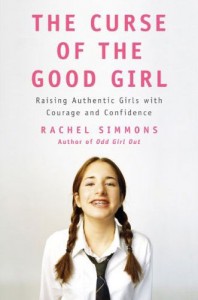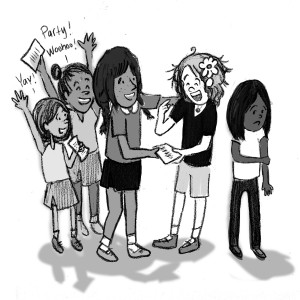|
|
September 26, 2013
Got an email from Concerned Mom whose smart, funny daughter has no trouble making friends, but lots of trouble keeping them. The pattern is this: Daughter gets close to other girls and feels accepted by them. Then, within weeks new found friends exclude and then ignore the girl. Naturally, she feels upset and alone, which, of course breaks Mom’s heart. She turned to me for advice and here’s what I told her:
I understand that it breaks your heart to see your daughter so unhappy. Of course you want her to make real friends who treat her with affection, kindness and respect. But it feels like something is missing in your email.
Each time your daughter is disappointed by a new friend you’ve listened to her side of the story, sympathized and offered comfort and support. All good! But there are at least two sides to every relationship story. That’s why I am curious about what’s going on from the other girls’ perspectives. Maybe you’re also wondering why each of these new friends turn against your daughter after such a short time? It’s a mystery worth exploring.
What might your daughter be doing (knowingly or unknowingly) to contribute to this reaction she often gets? How about if you ask her: “Why do you think ____ stopped wanting to be your friend?”
This question may bring up a lot of emotion, so please ask it in a neutral tone of voice. You’re not accusing your daughter of anything! You’re simply inviting her to put aside her sadness and think about what may be going on here. Right now, she’s hurt and confused and probably feeling powerless. She can regain some of her power by understanding how she functions in friendships because she plays a significant role in every one of them, whether she’s aware of it yet or not. To encourage her to think about that role you need to ask thoughtful, open-ended questions that have no “right” or “wrong” answers. Questions like “Why do you think this girl stopped being your friend?”
Listen to your daughter with an open heart and mind. Try not to interrupt. Initially, she may not say much. She might just shrug and say, “I don’t know.” In which case you might nod understandingly and say, “It’s hard to know why other people do what they do. But we usually have a reason. Your friends have been rude to you. If you could just guess why, what would you guess?”
Your daughter may have fallen into the habit of thinking of herself as a powerless victim to whom other people do unkind things. That’s not a good mental place for her to be. We want our girls to understand emotions (their own and other people’s). We also want them to feel confident in their ability to make and keep real friends. That includes learning to rebound from set-backs and to negotiate the ups and downs of relationships.
I hope this helps.
In friendship,
Annie
*Illustration by Erica De Chavez, from my upcoming The Girls Q&A Book on Friendship
UPDATE October 3, 2014: The Girls Q&A Book on Friendship: 50 Ways to Fix a Friendship Without the DRAMA is now available in print and on Kindle (the ebook can be read on any device, your mobile phone, tablet, or computer with the free Kindle reader app). Visit GirlsQandA.com for an excerpt, reviews, and to order your copy.

June 27, 2013
 Guiding each other toward independence by Megan Sullivan
Continuing July’s Independence theme, I’m pleased to post this guest blog by Megan Sullivan. Megan is a free-lance writer. She lives in Southern California with her husband and their two daughters.
My daughter is already fifteen, stands two inches taller than me and has a driver’s permit, so you would think that I would be prepared for anything. We made it through the training bra, the menstrual cycle and now we have moved onto “real bras.” I get embarrassed when boys look at her, but I really was coping with her maturing physique.
Then it happened… my little girl came to me, hair in a sweet braid, looking extra innocent with a piece of paper in her outstretched hand. I was thinking she must have achieved something in school or had a letter for me to sign. But when I looked closely at the paper I felt faint. She had printed out a Victoria Secret coupon (I’ve raised money-conscious kids!) and she wanted me to take her shopping for more grown-up undergarments.
Her smile said that she expected me to high five her choice in lingerie, drive to the mall to pick-up some lacy underthings, and send her out into the wide world with her thong straps showing above her waistline. Instead, she got Mom making sounds kept without forming sentences. My daughter has yet to start dating, but my mind leapt quickly from underwear to teen pregnancy, to appearing on one of those terrible daytime talk shows where everyone yells.
All I could utter was a stilted, “Why?”
Apparently, her friends shop at VS all the time and lately they had been poking fun at her off brand undies as she changed in the locker room. Nothing more to it than typical mean girl antics. I don’t remember kids being brand conscious down to the skivvies, but I can understand the desire to feel good about yourself and the need to fit in with your gal pals. I guess my generation did see the rise of Calvins.
Beyond impressing her besties, my daughter is growing into a woman and cares about her appearance from top to bottom. She laughed when I said, “Do we need to talk about boys again?” She promised that at this time these items were for herself, and reminded me that Victoria’s Secret carries plenty of ‘normal underwear’, not just sheer leopard print push-up bras.
“I’ll talk to you before a boy sees my underwear, Mom.” she promised, like a young woman present and in control of her choices.
So we went shopping together and my girl steered clear of the store’s naughtier items, barely even giving them a glance. She’s also taught me that there’s more to cute underwear than just sex appeal, so I picked up a few cute items of my own.
As our kids grow-up, sometimes they turn out to be more mature than we are. It’s a great feeling to be able to talk to your child like an adult, even if sometimes you still see her as a five-year-old. It’s a part of the path that was made for each of us. I admire my daughter’s smarts, sensitivity, and her sense of style. We won’t always see eye to eye, but I am learning to cope with this new chapter of parenting and enjoy our differences as she becomes a close friend.

November 29, 2009
 That's a good dog A couple of weeks ago I interviewed Rachel Simmons The Wise for my podcast series Family Confidential. We talked about her new book: The Curse of The Good Girl: Raising Authentic Girls With Courage and Confidence. We also discussed how often moms engage in meta-conversations with their daughters (i.e., Mom says one thing and a fingertip below the surface churns the unspoken message). With all that doublespeak how can a girl learn to be authentic and express the truth of her heart? Not very easily. And it isn’t just moms and daughters. As Rachel put it, no matter who you’re talking to or what relationship you’ve got, “… there’s always a meta-conversation going on.”
For example:
Parent: Oh, you’re still on the phone.
Meta-message: I just know you won’t get your homework done tonight and then what? You think I enjoy nagging you? Well, I don’t! But if I don’t stay on your case how are you ever going to get into a decent college??
Mini meta-message: You’re lazy and I’m disappointed in you.
Parent: Don’t you think your other jeans would look better with that top?
Meta-message: Those jeans are too tight and too low cut. They make you look fat and slutty. What will Grandma say when she sees you wearing that? She’s going to think I’m a bad mother to let you dress that way!
Mini meta-message: You’re fat and you embarrass me.
Parent: How’s Janie these days?
Meta-message: Are you two still friends? Did you hurt her feelings or do something to make her mad? Are you now hanging out with people I should be worried about? (Sigh) You and I used to be so close. Now you don’t tell me anything. What else are you hiding from me? I’m not sure I even want to know!
Mini meta-message: You’re not a good friend and I don’t trust you.
Visiting with family and friends this holiday weekend I’ve thought about meta-messages. And whether they’re conscious or not, communication patterns between people often determine who we like to hang out with and who doesn’t make our “favorites” list.
Early this morning me and my dog Josie snuck out of the house before anyone else was awake. We headed for the nearby hills and because Josie’s only 8 months old and full of beans I let her off-leash. She instantly vanished through the trees tracking deer and squirrels and nosing the underbrush for ticks thumbing a ride to our house. While she was gone I walked on, enjoying the quiet light and the colors. Every so often I’d whistle for Josie and she’d reappear. Sometimes from behind me on the trail. Sometimes from way ahead. We’d smile at each other and wag our tails. “Yes! Good dog!” Then I’d give her a treat. After each reunion she’d take off again and I continued hiking.
So it went for about an hour. When I finally put her back on leash I thought about the meta-conversation Josie and I had and why she happily kept returning to me. The way I figure, it comes down to this… each of us, dog or human, prefers to hang with people who tell us we are good dogs.
It also help if they give us treats.

November 9, 2009
 The Curse of the Good Girl by Rachel Simmons If you live or work with teen girls you don’t need me to tell you they can be way out there with their emotions. And you already know that girl friendships can be fraught with drama, misunderstandings, betrayals and recriminations. Which proves that being emotional doesn’t automatically translate into high Emotional Intelligence. (EQ, AKA getting real with yourself so you can be real with the people you’re close to. )
When teen girl emotion explodes around parents, they often do what moms and dads of my parents’ generation did… try to contain and sanitize the feelings. Why? Perhaps some parents sincerely believe that people who are too emotional get clobbered by life. Another possibility is that when confronted with a girl’s outburst that parents can’t “fix” the next best solution is to try to shut it down as quickly as possible. Either way the message is that some emotions are just not the “good girl” kind.
If a girl expresses sadness she may hear: “Cheer up. It can’t be all that bad!”
If she expresses fear she might get: “There’s nothing to be afraid of!”
If she rages over some real or imagined injustice she may be treated to some variation of this 20th century chestnut: “Better watch it, young lady. You’re getting a little too big for your britches.”
When I was a child, the most powerful phrase I knew was “Shut up!” Only used in a rare moment of frustration and laughably tame by today’s standards, those words were consistent show stoppers in my family and always followed by: “That language is unacceptable.” I realize now that it was my assertiveness that was truly unacceptable.
21st century parental messages to girls haven’t changed all the much: Don’t be sad. Don’t be scared. Don’t be angry. Oh, and while you’re at it: Don’t be shy. Don’t be worried. Don’t be embarrassed. Don’t be so silly. Don’t be so dramatic. Don’t be so smart.
If girls can’t be any of those things, what, in heaven’s name, are they supposed to be? Duh! They’re supposed to be GOOD! At all times sweet, loving and cooperative. Modest, supportive, nurturing, generous and nice. But what are girls expected to do when any of those other not so good and not so nice feelings pop up? No problem. If you want to be a good girl (Yes, please!) you learn to stuff it and smile.
In this week’s podcast I talk with Rachel Simmons, author of The Curse of the Good Girl: Raising Authentic Girls with Courage and Confidence. And what a terrific and important book it is. Here’s an excerpt:
________
To deepen your vision for your daughter, write her a letter (you don’t have to send it) and explore these questions:
- What do you wish you had known when you were her age? Think about the girl you used to be and the woman you are today. Focus on what you have learned about relationships, conflict, and self-confidence.
- What does being yourself mean to you?
- What did the female role models of your childhood teach you? If you did not have any, what do you wish you might have learned from a caring adult woman?
You have learned many lessons in your life. By defining them for yourself, you can begin thinking about how to convey practical wisdom to your daughter, in both what you say and how you act.
____________
Listen to my interview with Rachel Simmons right here:
[QUICKTIME http://www.anniefox.com/podcast/FC011.m4a 300 300 false true]
If you have iTunes, you can subscribe to this podcast in the iTunes Store.
Or, you can download an MP3 version here.
Upcoming guests include:
Rosalind Wiseman, author of Queen Bees & Wanna Bees and Queen Bee Moms & Kingpin Dads
Izzy Rose, author of The Package Deal: My (not-so) Glamorous Transition from Single Gal to Instant Mom
Diane E. Levin, co-author (with Jean Kilbourne) of So Sexy So Soon: The New Sexualized Childhood And What Parents Can Do to Protect Their Kids
Susan M. Heim, author of It’s Twins! and Chicken Soup for the Soul Twins and More
Hannah Friedman, author of Everything Sucks: Losing My Mind and Finding Myself in a High School Quest for Cool
Dara Chadwick, author of You’d Be So Pretty If…
*What’s a podcast? “A podcast is a series of digital media files, usually either digital audio or video, that is made available for download via web syndication.” –Wikipedia… So, in this case, there’s an audio file for you to listen to (in addition to reading the above).

| |















